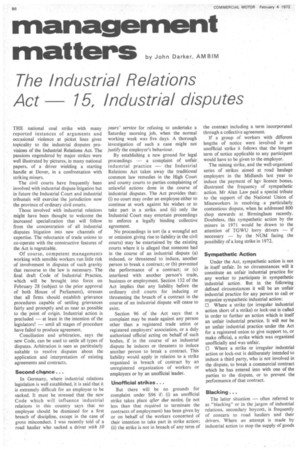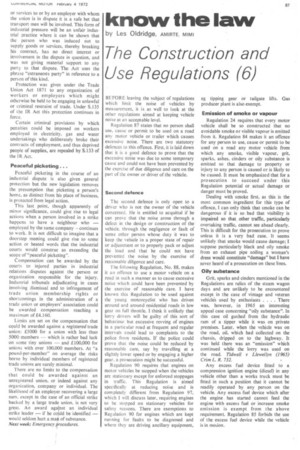management
Page 90

Page 91

If you've noticed an error in this article please click here to report it so we can fix it.
matters by John Darker, AMBIM
The In Relations Act 15, Industrial disputes
THE national coal strike with many reported instances of arguments and occasional violence at picket lines gives topicality to the industrial disputes pro visions of the Industrial Relations Act. The passions engendered by major strikes were well illustrated by pictures, in many national papers, of a driver wielding a starting handle at Dover, in a confrontation with striking miners.
The civil courts have frequently been involved with industrial dispute litigation but in future the Industrial Court and industrial tribunals will exercise the jurisdiction now the province of ordinary civil courts.
Those involved with industrial relations might have been thought to welcome the increased specialization that will follow from the concentration of all industrial disputes litigation into new channels of expertise. The reluctance of trade unions to co-operate with the constructive features of the Act is regrettable.
Of course, competent managements working with sensible workers run little risk of involvement in disputes of such gravity that recourse to the law is necessary. The final draft Code of Industrial Practice, which will be brought into force on February 28 (subject to the prior approval of both House of Parliament), stresses that all firms should establish grievance procedures capable of settling grievances fairly and promptly and as near as possible to the point of origin. Industrial action is precluded — at least in the intention of the legislators! — until all stages of procedure have failed to produce agreement.
Conciliation and arbitration, says the new Code, can be used to settle all types of disputes. Arbitration is seen as particularly suitable to resolve disputes about the application and interpretation of existing agreements and contracts.
Second chance ...
In Germany, where industrial relations legislation is well established, it is said that it is extremely difficult for an employee to be sacked. It must be stressed that the new Code which will influence industrial relations in this country says that no employee should be dismissed for a first breach of discipline, except in the case of gross misconduct. I was recently told of a road haulier who sacked a driver with 10 years' service for refusing to undertake a Saturday morning job, when the normal working week was five days. A thorough investigation of such a case might not justify the employer's behaviour.
By establishing a new ground for legal proceedings — a complaint of unfair industrial practice — the Industrial Relations Act takes away the traditional common law remedies in the High Court and county courts to parties complaining of unlawful actions done in the course of industrial disputes. The Act provides that: (i) no court may order an employee either to continue at work against his wishes or to take part in a strike. and (ii) only the Industrial Court may entertain proceedings to enforce a legally binding collective agreement.
No proceedings in tort (ie a wrongful act or omission giving rise to liability in the civil courts) may be entertained by the existing courts where it is alleged that someone had in the course of an industrial dispute (a) induced, or threatened to induce, another person to break a contract; or (b) prevented the performance of a contract; or (c) interfered with another person's trade, business or employment. Section 132 of the Act implies that any liability before the ordinary civil courts for inducing or threatening the breach of a contract in the course of an industrial dispute will cease to exist, Section 96 of the Act says that a complaint may be made against any person other than a registered trade union or registered employers' association, or a duly authorized official acting on behalf of such bodies, if in the course of an industrial dispute he induces or threatens to induce another person to break a contract. This liability would apply in relation to a strike organized in breach of contract by an unregistered organization of workers or employers or by an unofficial leader.
Unofficial strikes ...
But there will be no grounds for complaint under S96 if: (i) an unofficial strike takes place after due notice, (ie not less than that required to terminate the contracts of employment) has been given by or on behalf of the workers concerned of their intention to take part in strike action;
(ii) the strike is not in breach of any term of the contract including a term incorporated through a collective agreement.
If a group of workers with different lengths of notice were involved in an unofficial strike it follows that the longest term of notice applicable to any participant would have to be given to the employer.
The mining strike, and the well-organized series of strikes aimed at road haulage employers in the Midlands last year to induce the payment of hgv licence bonus, illustrated the frequency of sympathetic action. Mr Alan Law paid a special tribute to the support of the National Union of Mineworkers in resolving a particularly contentious dispute, when he addressed 800 shop stewards at Birmingham recently. Doubtless, this sympathetic action by the miners in 1971 would be drawn to the attention of TGWU lorry drivers — if necessary — by the NUM facing the possibility of a long strike in 1972.
Sympathetic Action Under the Act, sympathetic action is not in itself unfair. In no circumstances will it constitute an unfair industrial practice for any worker to participate in sympathetic industrial action. But in the following defined circumstances it will be an unfair industrial practice for any person to call or organize sympathetic industrial action:
El Where a strike (or irregular industrial action short of a strike) or lock-out is called in order to further an action which is itself an unfair industrial practice. It will not be an unfair industrial practice under the Act for a registered union to give support to, or make official, a strike which was organized unofficially and was unfair.
CI Where a strike or irregular industrial action or lock-out is deliberately intended to induce a third party, who is not involved in the dispute, to break a commercial contract which he has entered into with one of the parties to the dispute, or to prevent the performance of that contract.
Blacking.
The latter situation — often referred to as "blacking" or in the jargon of industrial relations, secondary boycott, is frequently of concern to road hauliers and their drivers. Where an attempt is made by industrial action to stop the supply of goods or services to or by an employer with whom the union is in dispute it is a safe bet that transport men will be involved. This form of industrial pressure will be an unfair industrial practice where it can be shown that the person who was induced not to supply goods or services, thereby breaking his contract, has no direct interest or involvement in the dispute in question, and was not giving material support to any party to that dispute. The Act uses the phrase "extraneous party" in reference to a person of this kind.
Protection was given under the Trade Union Act 1871 to any organization of workers or employers which might otherwise be held to be engaging in unlawful or criminal restraint of trade. Under S.135 of the IR Act this protection continues in force.
Certain criminal provisions by which penalties could be imposed on workers employed in electricity, gas and water undertakings who deliberately broke their contracts of employment, and thus deprived people of supplies, are repealed by S.133 of the IR Act.
Peaceful picketing ...
Peaceful picketing in the course of an industrial dispute is also given general protection but the new legislation removes the presumption that picketing a person's home, as distinct from his place of business, is protected from legal action.
This last point, though apparently of minor significance, could give rise to legal actions when a person involved in a strike happens to have a neighbour who — employed by the same company — continues to work. It is not difficult to imagine that a doorstep meeting could give rise to some action or heated words that the industrial courts would construe as exceeding the scope of "peaceful picketing".
Compensation can be awarded by the courts to injured parties in industrial relations disputes against the person or organization responsible for the injury. Industrial tribunals adjudicating in cases involving dismissal and to infringement of trade union membership rights or shortcomings in the administration of a trade union or employers' association could be awarded compensation reaching a maximum of £4.160.
Limits are set on the compensation that could be awarded against a registered trade union: £5000 for a union with less than 5000 members — which is rather bad luck on some tiny unions — and £100,000 for unions with over 100,000 members. At "a pound-per-member" on average the risks borne by individual members of registered trade unions are surely minimal.
There are no limits to the compensation that could be awarded against an unregistered union, or indeed against any organization, company or individual. The likelihood of an employer recoyering a large sum, except in the case of an official strike backed by a large trade union, is not very great. An award against an individual strike leader — if he cotild be identified — would seldom hurt a mail of substance. Next week: Emergency procedures.














































































































































